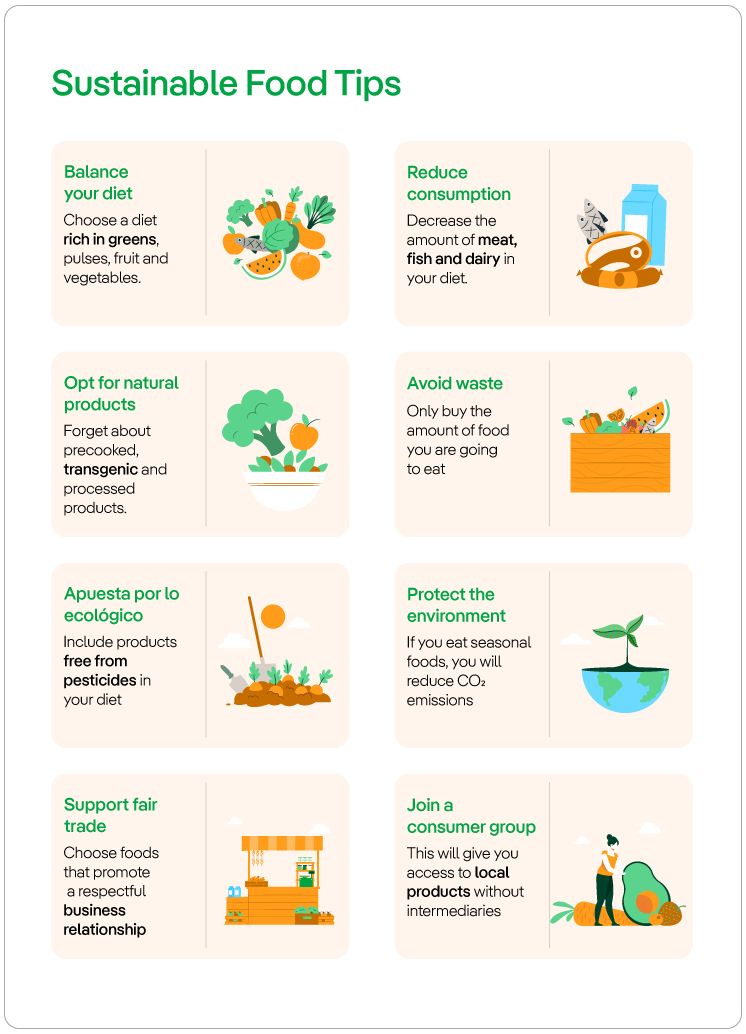Discover Sustainable Food Practices In Delis: Tips & Tricks!
Can the humble deli, a cornerstone of countless communities, truly embrace a future of sustainability? The answer, increasingly, is a resounding yes. The push for eco-conscious practices isn't just a trend; it's a fundamental shift reshaping how we source, prepare, and consume food, and delis are perfectly positioned to lead the charge towards a more sustainable culinary landscape.
The modern deli faces a unique set of challenges and opportunities. From the constant flow of ingredients to the disposal of packaging, the environmental impact can be significant. However, by adopting innovative practices, delis can drastically reduce their footprint, enhance their reputation, and, ultimately, thrive in a world that demands greater responsibility. This transformation hinges on a multi-pronged approach, incorporating everything from mindful sourcing to waste reduction strategies and energy-efficient operations. Let's delve into the key areas where delis can make a tangible difference.
One of the most impactful changes a deli can undertake is to revolutionize its sourcing strategies. This begins with a commitment to prioritizing local and seasonal ingredients. Sourcing locally minimizes transportation distances, thereby reducing carbon emissions associated with shipping. Furthermore, it supports local farmers and producers, fostering a stronger sense of community and bolstering regional economies. Consider a deli in the heart of the Napa Valley, for example. Instead of importing produce from across the country, they could build relationships with nearby farms, securing fresh, seasonal ingredients that are not only better for the environment but also boast superior flavor profiles. The same principle applies to meats and cheeses. Partnering with sustainable farms that prioritize ethical animal husbandry and responsible land management practices is crucial. Look for certifications like Certified Humane or Animal Welfare Approved to ensure that the products align with your sustainability goals.
Beyond location, the origin of food production is a factor. Consider opting for ingredients with certifications such as organic, fair trade, or sustainable seafood. These certifications provide assurance that the products have been produced in a manner that minimizes environmental harm and supports fair labor practices. For example, the use of certified organic coffee beans, sourced from farms that prioritize soil health and biodiversity, can significantly reduce a deli's environmental footprint. Similarly, when offering seafood, selecting species that are sustainably caught or farmed, as certified by organizations like the Marine Stewardship Council (MSC), is paramount for protecting marine ecosystems. The choice of ingredients should also consider the environmental impact of the food production process. Reducing meat consumption is a notable step. This means offering delicious vegetarian and vegan options on the menu, and featuring plant-based ingredients in the place of meat in some items. It is more than just offering these products; it is an art of promoting these products by including their health and environmental benefits.
Waste management is a critical area for improvement in delis. The amount of food waste generated can be significant, and its disposal contributes to landfill overcrowding and the release of greenhouse gases. A proactive approach to waste reduction should be a cornerstone of any deli's sustainability plan. One of the first steps is to implement rigorous inventory management practices. This involves carefully tracking ingredient usage, forecasting demand accurately, and minimizing over-ordering. By reducing the amount of excess ingredients that end up spoiling, delis can drastically cut down on food waste. This approach might involve regular menu adjustments based on seasonal availability. Implementing a comprehensive composting program is another essential waste management strategy. Food scraps, coffee grounds, and other organic waste can be diverted from landfills and transformed into nutrient-rich compost, which can be used to enrich soil. This process is a simple step that makes a huge impact. Partnering with a local composting facility or establishing an on-site composting system can be a game-changer for a deli's environmental impact.
Moreover, rethinking packaging is vital. Delis often rely heavily on single-use packaging for takeout orders and prepared foods. The use of disposable plates, containers, and utensils contributes significantly to waste generation. Transitioning to eco-friendly packaging alternatives is an excellent step to reduce environmental impact. Using compostable or biodegradable containers, made from materials like plant fibers or recycled paper, is an ideal alternative to traditional plastic packaging. Using these options ensures packaging will eventually decompose into soil. Encouraging customers to bring their own reusable containers and offering discounts for those who do so is a powerful incentive to reduce single-use packaging. Even offering reusable bags for takeout orders can make a huge difference. It is more than just reducing packaging, the same practice can attract customers to make them feel connected to a more responsible business.
Energy efficiency is another area where delis can make significant strides towards sustainability. Energy consumption in a deli can be substantial, especially considering the need for refrigeration, cooking appliances, and lighting. Investing in energy-efficient equipment is a smart move for both the environment and the bottom line. Replacing old refrigerators and freezers with models that are Energy Star certified can lead to significant energy savings over time. Furthermore, utilizing energy-efficient cooking appliances, such as induction cooktops and convection ovens, can reduce energy consumption. It is also good to switch to LED lighting throughout the deli, which consumes significantly less energy than traditional incandescent or fluorescent bulbs. These changes are a smart investment in the business. Implementing other energy-saving practices, such as optimizing thermostat settings, turning off lights and equipment when not in use, and sealing air leaks, can further reduce energy consumption.
Water conservation is another area that warrants attention. Water usage in a deli can be significant, especially for cleaning, food preparation, and dishwashing. Adopting water-saving practices can not only conserve this precious resource but also reduce operating costs. Installing low-flow faucets and toilets in the deli's restrooms can significantly reduce water consumption. In the kitchen, using water-efficient dishwashers and pre-rinsing dishes with a spray nozzle can also make a difference. Training staff to conserve water during food preparation and cleaning tasks is also very important. Consider reusing water, too. For example, reusing water from washing vegetables or fruits. This practice will have a big impact on water conservation.
The choices a deli makes in its purchasing decisions extend beyond ingredients to the supplies used for day-to-day operations. Opting for sustainable cleaning products, made from plant-based ingredients and free of harsh chemicals, is a step towards reducing the deli's environmental impact. These products are not only better for the environment but also safer for employees. Purchasing recycled paper products, such as napkins, paper towels, and toilet paper, is another simple but effective way to reduce waste and conserve resources. The same applies to office supplies. Choosing recycled paper, pencils made from recycled materials, and other eco-friendly office supplies is an environmentally friendly way to run the business.
Educating and empowering staff is another important aspect of implementing sustainable practices. It starts with creating a culture of sustainability within the deli. Training employees on the importance of sustainable practices and how to implement them is a necessary step. Encouraging them to embrace the deli's sustainability goals and empowering them to make eco-conscious choices is critical. This includes providing staff with training on proper waste sorting techniques, composting procedures, and the use of energy-efficient equipment. Recognizing and rewarding employees for their sustainability efforts can also foster a sense of ownership and encourage participation.
Transparency and communication with customers is another important element. Delis should be open and transparent about their sustainability efforts. Displaying information about sourcing practices, waste reduction initiatives, and energy-saving measures can help customers feel connected to your business. This might involve posting signs about the deli's commitment to local sourcing, composting, or using eco-friendly packaging. Providing customers with information about the environmental benefits of choosing sustainable options can also encourage them to make more conscious choices. Sharing updates about the deli's sustainability progress through social media and other communication channels can also build customer loyalty and attract environmentally conscious consumers.
Measuring the success of sustainability efforts is very important. Delis should regularly monitor and evaluate their sustainability performance. Tracking key metrics, such as waste generation, energy consumption, and the amount of locally sourced ingredients used, can help identify areas for improvement. This also involves setting realistic goals and targets for sustainability improvements. For example, a deli might aim to reduce its waste by a certain percentage within a year or increase the percentage of locally sourced ingredients used. Regularly reviewing sustainability data and using it to inform future decisions can help delis continuously improve their environmental performance and adapt to changing circumstances. The analysis may include the financial impact of sustainable practices. Tracking costs and savings associated with eco-friendly initiatives, such as energy-efficient equipment or compostable packaging, can help delis assess the return on investment and make informed decisions about future investments.
The deli industry is undergoing a gradual but significant transformation. More and more delis are recognizing the importance of sustainability. From the heart of bustling city centers to the quiet corners of the countryside, delis are embracing eco-conscious practices, driving a wave of positive change across the food industry. Sustainability is not just a trend; it's becoming a fundamental element of a successful deli business, one that resonates with consumers and contributes to a healthier planet.
| Sustainable Food Practices in Delis - Key Areas | Details |
|---|---|
| Sourcing | Prioritize local and seasonal ingredients, source from sustainable farms, consider certifications like organic, fair trade, and sustainable seafood. |
| Waste Management | Implement inventory management, composting program, and change from traditional to sustainable packaging. |
| Energy Efficiency | Use energy-efficient equipment (refrigerators, ovens), switch to LED lighting, optimize thermostat settings. |
| Water Conservation | Install low-flow fixtures, train staff on water-saving practices, consider water reuse. |
| Supplies | Use sustainable cleaning products, purchase recycled paper products, and choose eco-friendly office supplies. |
| Staff Education and Empowerment | Train staff on sustainability practices, create a culture of responsibility. |
| Customer Communication | Be transparent about sustainability efforts, display information about sourcing and waste reduction. |
| Measurement and Evaluation | Track key metrics, set goals, regularly review sustainability data, and analyze the financial impact of sustainable practices. |
The journey toward a more sustainable deli is an ongoing process. It requires a commitment to continuous improvement, adaptation, and innovation. Delis that embrace this journey will not only contribute to a healthier planet but also enhance their brand reputation, attract environmentally conscious customers, and build a more resilient and sustainable business model. The future of the deli, like the future of food itself, is inextricably linked to the adoption of sustainable practices.


